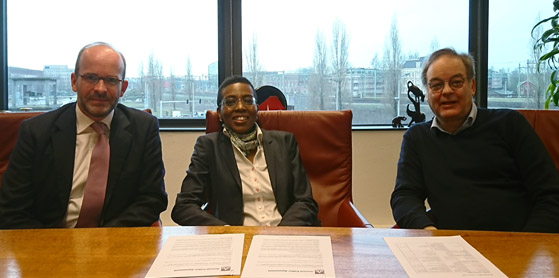UCT Tax Law Prof is new Chief Editor

Prof Hattingh takes over the reins at the IBFDs Bulletin for International Taxation
What makes the field of Tax Law interesting? According to Associate Professor Johann Hattingh, it is that the field of tax provides the opportunity continually to find new aspects of interest because it has so many sides - and it invites study through a range of different lenses. “It is the multifaceted nature of the field”, says Hattingh, “which appeals to the way my brain is wired. No matter where you visit on this planet one is bound to encounter interesting tax issues that sit close to the surface of current political and societal debates.”
Hattingh recognises, after 20 years in this field, that to immerse oneself in the study of international taxation, continued exposure to other cultures and ways of thinking about similar problems and challenges are required – along with a certain international-mindedness. He describes tax and tax law as “an endless field of learning”, and the idea of being in eternal “scholar mode” greatly appeals to him. In short, says Hattingh, “international tax is fun for an inquisitive mind!”.
It is these perspectives – and his years of research in the field – that has earned Associate Professor Hattingh the place of Chief Editor for one of the world’s leading (and perhaps the mostly widely read) international tax journals.
The Bulletin for International Taxation, published by the International Bureau of Fiscal Documentation (IBFD), is an academic journal that is read globally. This journal serves to disseminate knowledge about international taxation and has over its long history of 73 years provided one of the pre-eminent forums where peers can challenge - in a theoretical and responsible manner - existing tax frameworks that no longer serve the needs of societies.

Prof Johann Hattingh (left) with his Bulletin colleagues [pic courtesy of IBFD]
As a tax treaty scholar particularly interested in how the structure of legal thought impacts judicial interpretative methods around the resolution of similar problems in different countries, Hattingh’s work on the journal continuously highlights how much more there is to learn. Says Hattingh, “These journals are, so to speak, engine rooms of science.”
Every year a number of Bulletin articles are made available free to the public – all one needs to do is to sign up to the IBFD email newsletter to be alerted to these opportunities. In terms of the Bulletin’s open access policy, articles may be made available to the public after a period of time following publication.
While the journal is aimed at an academic audience, it is not exclusively so and is written in fairly accessible language. To ensure accessibility of academic research at UCT, the Tax Unit for Fiscal Research offers a range of public seminars based on tax-focused research, and many of the Unit’s academics are on social media. For example, follow the Tax Unit (Tax@UCT) and Associate Prof Hattingh (@ProfJHattingh) for alerts on important tax-related developments and publications.
With regard to his new role as Chief Editor of the Bulletin for International Taxation, Associate Prof Hattingh comments that he is deeply conscious of the august shoes he is filling and has therefore approached this role with humility and the greatest respect for authors who are willing to invest their energy to write for a leading and demanding international journal. Recognising that it takes a lot of time to write articles for a journal such as the Bulletin, he sees his Chief Editor role as helping authors to produce the best possible result from their endeavours. “It is important that authors want to write for the journal, so the Chief Editor needs to create an exciting space for engagement. A good dose of diplomacy is also required since one interacts daily on a global scale,” says Associate Prof Hattingh.
In addition to be being Chief Editor of the Bulletin for International Taxation, Associate Prof Hattingh is also on the editorial board of the International Tax Law Reports (published by LexisNexis UK). It is the only publication of its kind where court decisions from around the world are gathered, translated into English and published with incisive commentaries to improve understanding of how judges solve cross-border tax disputes.